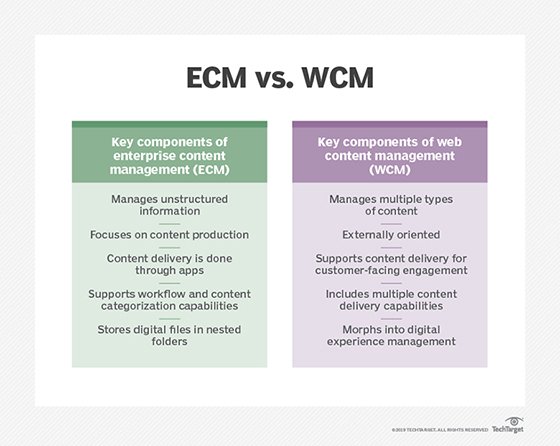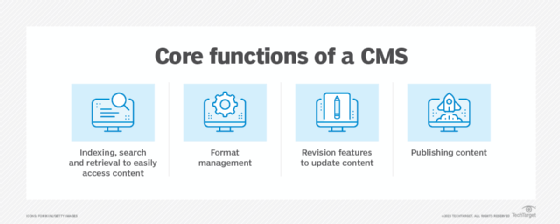
What's Content Management System (CMS)
A content management system (CMS) is a software application that enables users to create, edit, collaborate on, publish and store digital content. CMSes are typically used for enterprise content management (ECM) and web content management (WCM).
How does a CMS work and how is it used?
A CMS provides a graphical user interface with tools to create, edit and publish web content without the need to write code from scratch.
A CMS has two components: a content management application (CMA) and a content delivery application (CDA).
What's the difference between a CMS, ECM and WCMS?
A CMS, ECM and WCMS all manage content, but there are differences between them:
- The CMS is the precursor to the ECM system. A CMS is a place to create, manage and store digital content, and works best with structured content -- such as documents and database records.
- An enterprise content management system manages both structured and unstructured content. It includes software, strategies and security to effectively manage content.
- A web content management system is similar to an ECM system, but the differentiating factor is the WCMS is for web content -- such as product pages on e-commerce websites. It contains a publishing tool and facilitates collaborative authoring.

CMS features
Features can vary amongst the various CMS offerings, but core functions include:
- Intuitive indexing, search and retrieval. These features index all data for easy access through search functions and enable users to search by attributes such as publication dates, keywords or author.
- Format management. This helps turn scanned paper documents and legacy electronic documents into HTML or PDF documents.
- Revision features. These features enable content to be updated and edited after initial publication. Revision control also tracks any changes individuals make to files.
- Publishing. This functionality enables individuals to use a template or a set of templates that an organization approves -- as well as wizards and other tools -- for content creation and modification.
A CMS may also provide tools for personalization, or one-to-one marketing. One-to-one marketing is the ability of a website to tailor its content and advertising to a user's specific characteristics using information a user provides or a website gathers. For example, if a user searches for digital cameras in major search engines -- such as Google -- advertising banners may feature businesses that sell digital cameras instead of businesses that sell gardening products.

Other popular CMS features include:
- search engine optimization-friendly URLs;
- integrated and online help, including discussion boards;
- group-based permission systems and security;
- full template support and customizable templates;
- easy wizard-based install and versioning procedures;
- admin panel with support for multiple languages;
- minimal server requirements;
- integrated file managers; and
- integrated audit logs.

Benefits of using a CMS
There are a number of benefits to using a content management system, including:
- Ease of use. Due to a graphical user interface, even those with limited technical knowledge can use the software.
- Easy to search for information. A built-in search function enables users to enter what they are searching for and have a list of items returned to them -- much like a Google search engine.
- Easy to manage content. Not only is creating content easy, but so is removing content. A CMS makes it easy to unpublish content to keep websites up to date.
- Accessible from anywhere. A CMS can be cloud-based or on premises, but users can access content from anywhere with a device that's connected to the internet.
- Allows multiple users. A CMS makes it easy to manage publishing permissions.
- Instant content updates. A CMS enables users to manage and update content in real time -- without needing to wait for a developer.
- Easy to scale. A CMS makes it easy for businesses to add new web pages as their business grows without the need for a developer.
- Easy to update. Development teams can roll out updates with just a few clicks.
Source: Techtarget.com

{{ 'Comments (%count%)' | trans {count:count} }}
{{ 'Comments are closed.' | trans }}